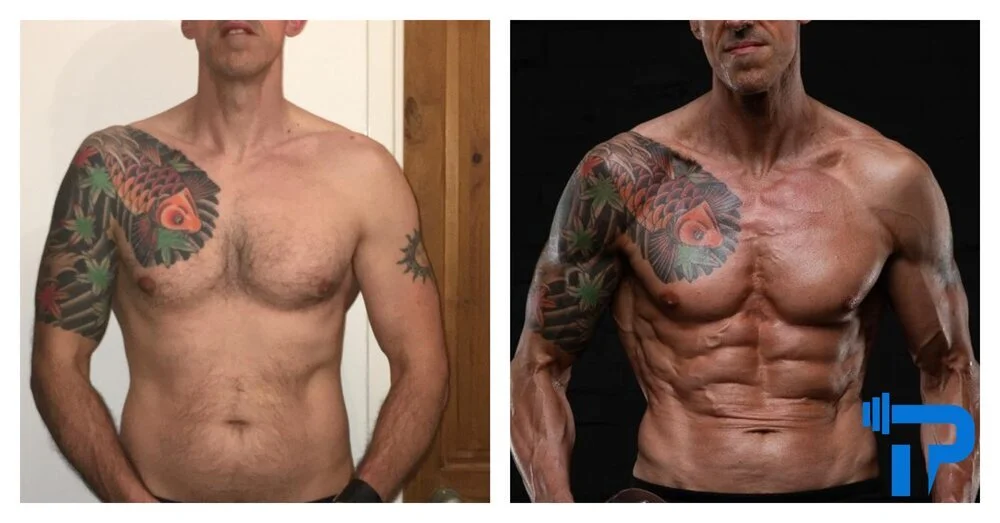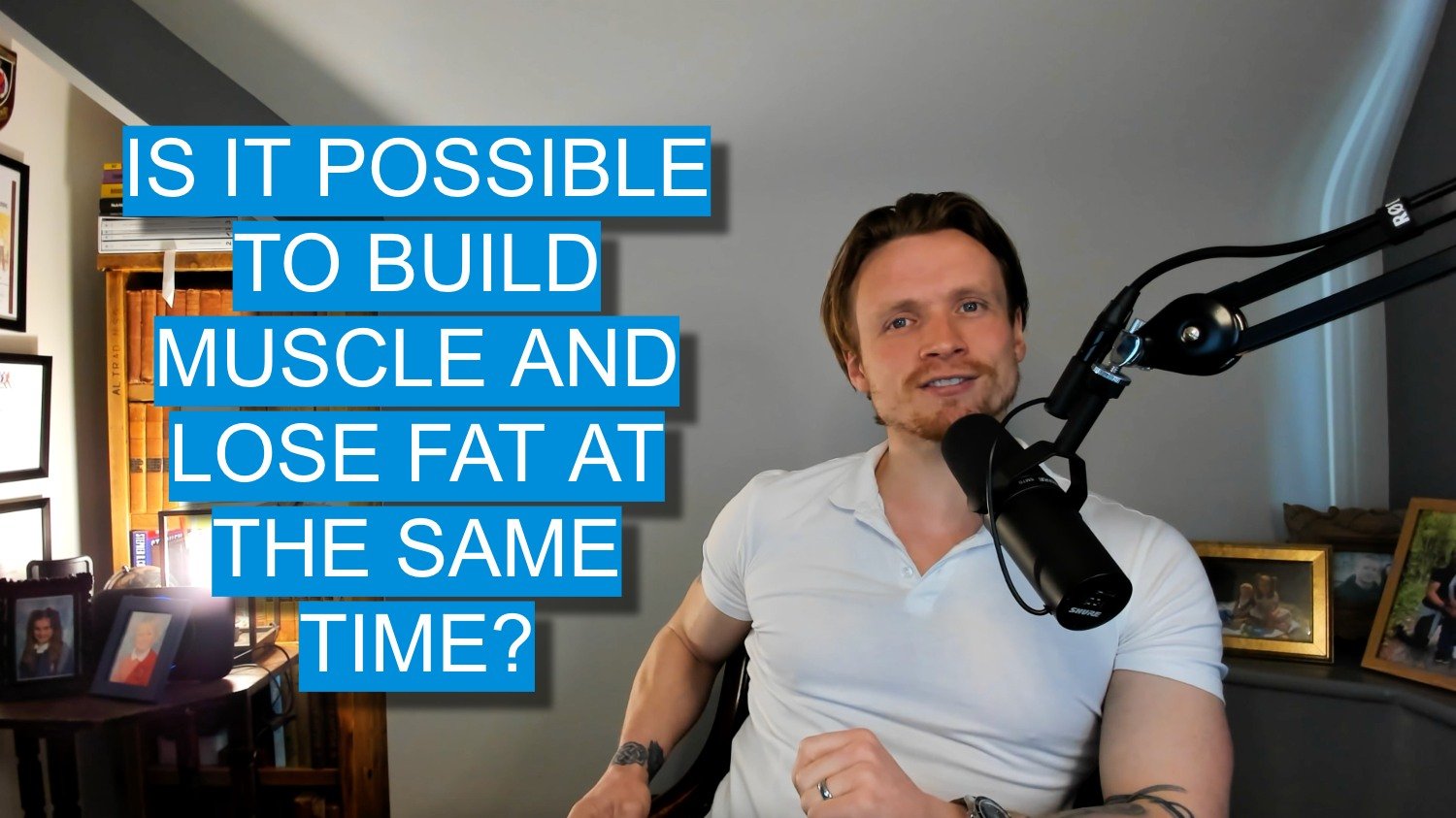Body Recomposition - How to build muscle whilst losing fat
Can I build muscle and lose fat at the same time?
Yes you can, my clients achieve this and so can you! Check out Kris’ transformation…
Building muscle and losing fat simultaneously, also known as body recomposition, is one of those infamous subjects that gets a lot of heated debate within the fitness coaching world.
Prefer to watch than read? Then please check out the video below:
The reason coaches suggest you can't do this simultaneously is due to its physiological nature, which is...
To lose fat, you'll need to be in a catabolic state; this will be achieved by being in a caloric deficit, which is consuming fewer calories than your body requires to maintain its current body weight, this is known as cutting.
To gain muscle mass, you'll need to be in an anabolic state; this will be achieved by creating a caloric surplus, which is consuming more calories than your body requires to maintain normal energy balance, this known as bulking.
When you commence operation bulk, you'll be in a prime state to build muscle due to the excess calories, but you do risk an increase in body fat. Cutting is the opposite; when you're shedding fat, it could result in muscle loss. Thus the premise that one could do both at the same time, is hard for many to fathom.
But I'm here to tell you that building muscle and losing fat at the same time is not only possible, it's probable!
I'm not here to just share my opinion and tell you that I've done this with thousands of individuals all over the world, even if I have ;) I'm here to hit you with some knowledge bombs via science. That's right, science!
There are more than a few studies that support body recomposition, or 'body recomp' if you're one of the cool kids.
In 1993 a study conducted at the Human Performance Laboratory at the University of Nebraska to determine whether muscle hypertrophy is possible during weight loss. Fourteen untrained obese women followed a very low-calorie diet whilst undertaking a resistance training programme. These women were, in fact, able to lose fat and increase muscle.
However, extreme deficits like this are not advised if body recomposition is the goal. In 2011 a randomised control trial carried out on twenty-four athletes, doing four resistance sessions per week, compared the difference between a 19% deficit and a 30% deficit. In conclusion, the 19% deficit group reduced fat while building lean mass and the 30% deficit group lost a similar amount of fat, but sacrificed lean muscle mass during the process.
Now you know that body recomposition is possible, let's go through how it's done.
How to Body Recomp
Lift weight
Resistance training is going to be the main driving force of body recomposition; your muscle will not get bigger unless they need to. Focus on lifting heavy and progressively increase the resistance each week, between 6 to 12 reps and 3 to 4 sets on each exercise. You'll need to train at least twice a week and perform 10 to 20 sets per week on each body part.
Eat protein
In a 2015 randomised control trial, athletes were able to maintain weight, build muscle and lose fat by following a resistance training programme and consuming a high protein diet which contained 3.4 grams of protein per kg of their body weight, yes, that's a lot of protein I know!
You don't need to consume a diet that rich in protein, around 1.8 grams per kg of your body weight will be plenty.
Small deficit
To effectively initiate body recomposition, you'll need to create a small deficit. With a larger deficit, there would be more chance of your body breaking down muscle mass as an energy source, so opt for a smaller deficit, around 10 to 20% fewer calories than would be required to maintain your body weight.
Even though body recomposition is possible for most of us, there are some people it's better for, and others should opt for either cutting or bulking.
The people who will see the best Recomp results are:
New lifters
When you're new to the gym, you can look at a set of dumbbells and make gains; this is because you’re far away from your genetic potential so there is a lot of room for improvement. Therefore, even if a new lifter is in a caloric deficit to lose fat, they will still build muscle, thus losing fat and building muscle at the same time.
Overweight individuals
If you're overweight, you'll be able to build muscle and lose fat at the same time. This is because your body can use the energy stored in fat to fuel the muscle-building process. Furthermore, people who are overweight are often untrained individuals, so they benefit from 'newbie gains'.
Detrained and suboptimal lifters
If you've gained a significant amount of muscle in the past, then lost it from being injured or from enjoying a break from the gym, then you'll be able to rebuild that muscle a lot quicker than it initially took you to develop it. This scenario can absolutely occur while losing fat. And, even if you're a person who's been lifting for a long time, you might not have been training hard or smart enough, so if I was to decrease your calories, but increase your training volume and training intensity, there's a good chance you'll build muscle and lose fat at the same time.
As you can see, most people will likely land in one of these categories. If you're overweight, new to lifting, detrained or just don't train hard enough, you can absolutely build muscle and lose fat simultaneously.
That being said, if you're an advanced lifter, pretty lean, and are already following an optimised nutrition and training programme, you're likely to see much better results pursuing bulking and cutting cycles.
Furthermore, even if you're one of us who are likely to see exceptional body recomposition results, you're still best having a focus, a priority, which should be either to build muscle or to lose fat. This, of course, depends on your current body composition. Whether you wish to focus on building or losing fat, if you want to get the best body recomposition results, you need to create either a ‘slight’ deficit or a ‘slight’ surplus. A study done by Garthe and colleagues showed that even when they overfed athletes by 600 calories per day, they didn't gain significantly more muscle but did gain significantly more fat – in fact, it was over three times the fat mass
Extreme bulks and cuts do have their place in certain circumstances, but not when the goal is Recomp.
I hope you enjoyed reading this as much as I enjoyed writing it!
If you liked it, then please share it with your friends.
And if you wish to know more about how you can effectively Recomp, then please check out my online personal training service where I'll personally coach you through your body recomposition transformation.



